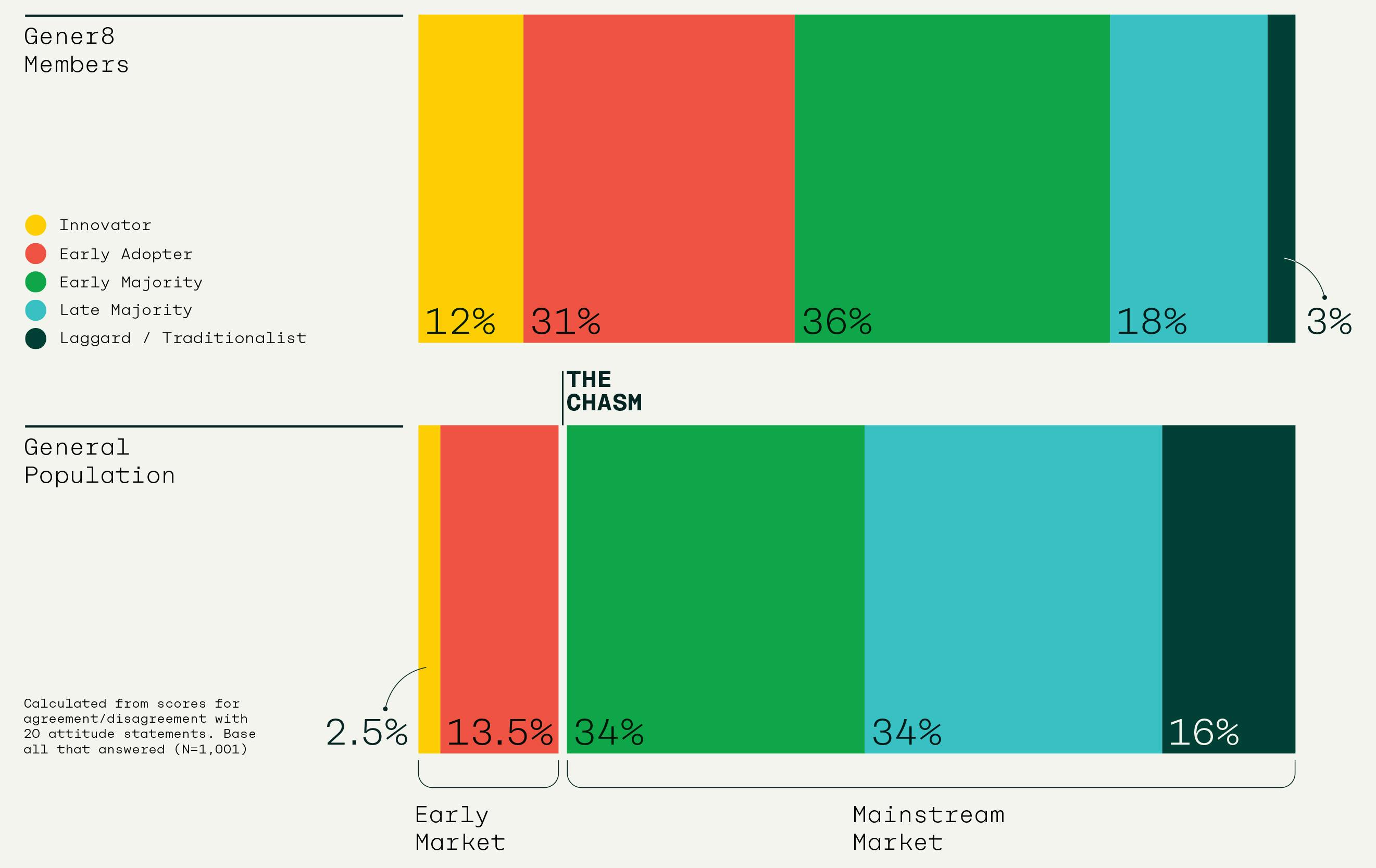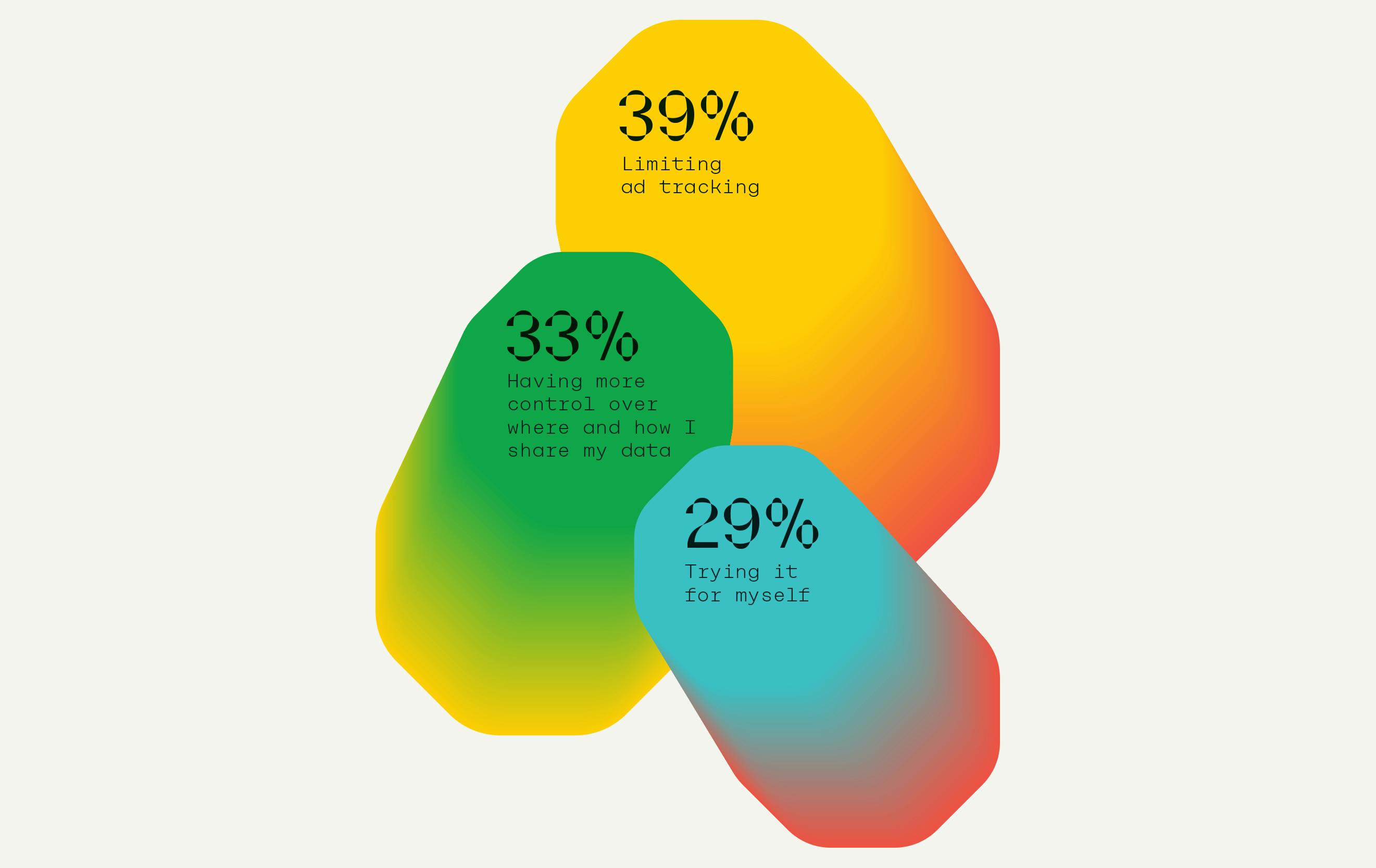Blog
Data unions can get mass adoption. Here’s how
By Tamsin Bishton
28.09.2022
Data unions move from niche to mass markets when they offer people both value and control when it comes to their data. That’s the standout finding from our latest qualitative and quantitative research for Pool
Wilsome has been researching the changing landscape around data since 2018. During that time we’ve talked with cryptocurrency token holders, leaders in data-led businesses, personal data vault users, potential data union members and data buyers about their needs and challenges.
In our latest research with Pool, conducted during May and June 2022, we surveyed 1,200 people who had already signed up to Gener8, the privacy and rewards platform of Dragons’ Den fame. We also spoke with 19 people on either side of ‘the chasm’ in a qualitative study involving a series of focus groups and one-to-one interviews.
The quantitative survey compared the attitudes and behaviours of Gener8’s members with the general population (benchmarked by DMA’s data privacy survey). The qualitative study explored wider consumer attitudes and behaviours in relation to data and privacy, before inviting participants to consider four data union propositions (Gener8, Swash, Unbanx and Ozone) to assess whether they would like to join.
Early majority consumers are joining data unions
We first spoke to consumers about data unions back in 2019 during a series of focus groups and interviews. Back then the idea of a data union was novel, and while there was plenty of interest from many once the idea was explained, only a handful of innovators and early adopters were in a place to grasp the proposition quickly.
This time it’s clear that data unions are ‘crossing the chasm’, with mass market ‘early majority’ and ‘late majority’ consumers joining in meaningful numbers.

Adoption curve models used to segment product markets estimate that early majority consumers make up around a third (34%) of the population. Our survey with Gener8 members showed that the membership is dominated by innovators and early adopters, but that 36% of them fall into the early majority mindset. There are also some late majority and even some ‘laggards’ present in the sample.
In our qualitative research with early adopter and early majority consumers we found that 14 of the 19 people we spoke to found one or other of the data union propositions appealing enough to cross the chasm and become members. Nine of the 14 were early adopters and five were from the early majority mindset.
The evidence that data union platforms are beginning to have mass market appeal appears strong.
What motivates people to join a data union?
Our survey showed that for the great majority (75%) of Gener8 members, the financial reward was the biggest motivation. This was also a motivating factor for participants in the qualitative study.
However, alongside this we heard in this research the same message we’ve heard in previous studies with consumers on this topic: for many people there is a desire to exert control over their data and their privacy in the digital world.
After money, the surveyed Gener8 members said they were motivated by:
- Limiting ad tracking (39%)
- Having more control over where and how I share my data (33%)
- Trying it for myself (29%)

Qualitative research participants described their sense of frustration at the lack of control they have over their data and the lack of trust they have generally in the practices of technology companies in this context. So a substantial research process is required before trying out a data union – particularly for early majority people.
We uncovered that people take a number of steps before committing to a data union, and at the research stage people were looking for:
- A clear proposition that tells them what they have to do and what they get in return
- Transparency and detail about who is providing the service and what they are gaining from the trade
- Third-party validation from ‘someone like me’
- A simple process and seamless installation/sign-up
- A fair reward – though defining this is complicated.
Are data unions just for data ‘pragmatists’?
Our analysis of Gener8’s members in the context of the general population segmentation established by DMA’s data privacy research showed that they were most similar in attitude to those the DMA defined as ‘data pragmatists’. These are consumers who are concerned about data privacy but are willing to make trade-offs with businesses on a case-by-case basis.
Our qualitative research also highlighted that pragmatism is certainly an attitude that helps some people try out membership of a data union. According to the DMA’s research, data pragmatists make up around half of the population (46%), so it’s a big potential market.
And there are plenty of people (the other half of the population according to the DMA’s segmentation) who either say they aren’t thinking about privacy (‘data unconcerned’), or who are thinking about it very deeply and reject any trading relationship on principle (‘data fundamentalists’). Our qualitative research suggests that at least some of the first group – people who say they aren’t concerned – are choosing not to engage with the subject because they feel there’s no point and that the tech companies hold all the control.
The second group also showed up in our research and made it clear that for them the only way to exert control is to not use tech provided by data hoarding companies in the first place.
It seems these two groups are both coming to the same conclusion about data unions: they can’t help with the challenge of control. The indication in our research is that money or financial rewards will not offer enough motivation to overcome that barrier for some people in these groups.
So our question for the wider community of data union operators as a result of our research this time is: Can data unions step up to meet this deeper desire for both value and control?
With the changing legislative landscape – particularly in the EU – giving consumers more powers to take charge of their data, the opportunity is there for data unions to become a place for people to get paid and exert that control. If they can grasp this opportunity, then perhaps we are on the verge of a real tipping point in the power balance between individuals and the technology giants as data unions potentially move into the mainstream.
Sign up to our email newsletter to keep up with future news and details of Pool events